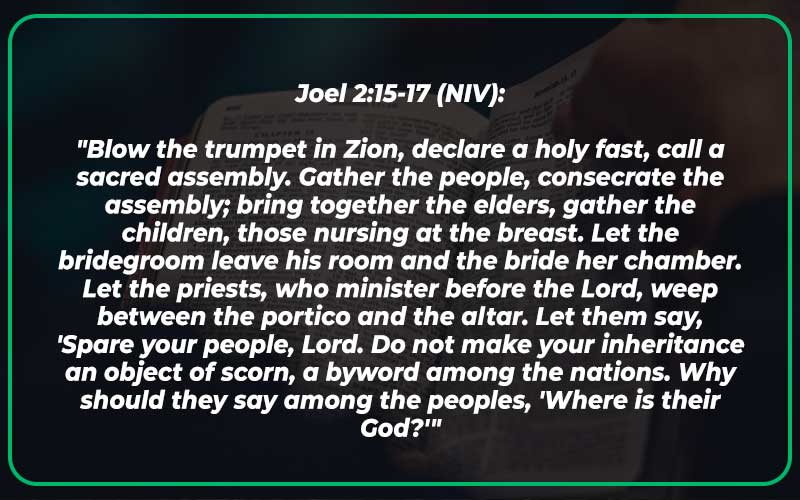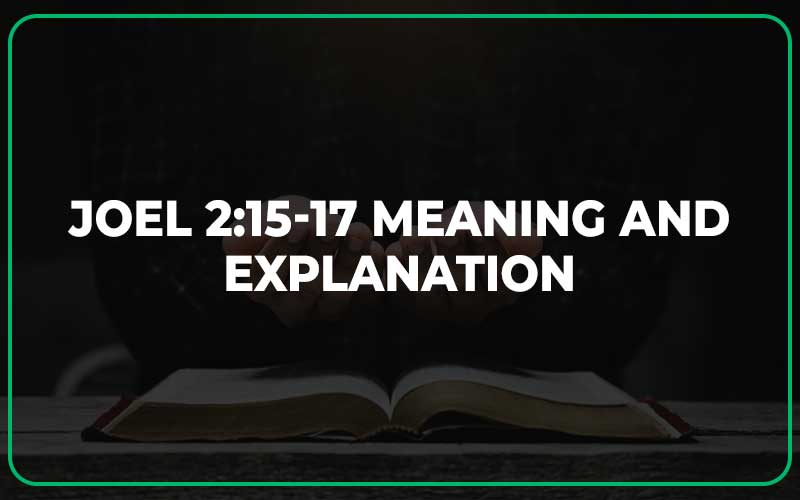Joel 2:15-17 (NIV):
“Blow the trumpet in Zion, declare a holy fast, call a sacred assembly. Gather the people, consecrate the assembly; bring together the elders, gather the children, those nursing at the breast. Let the bridegroom leave his room and the bride her chamber. Let the priests, who minister before the Lord, weep between the portico and the altar. Let them say, ‘Spare your people, Lord. Do not make your inheritance an object of scorn, a byword among the nations. Why should they say among the peoples, ‘Where is their God?'”
What does Joel 2:15-17 mean?
Joel 2:15-17 speaks about the need for repentance and seeking God’s mercy. It emphasizes the importance of calling the people together for a sacred assembly, consecrating a fast, and gathering all members of the community, from elders to infants.
The verses calls for collective repentance and intercession before the Lord, acknowledging the need for His forgiveness and mercy. The priests are urged to weep and plea for God’s compassion, so that the reputation of His people is not tarnished among the nations.
Explanation and Commentary of Joel 2:15-17
Joel 2:15-17 demonstrates the crucial importance of seeking God’s mercy and repenting as a community. It reveals the urgency and seriousness of the situation and emphasizes the need for collective action in times of crisis.
The trumpet, blown in Zion, is a call to wake up and come together before God. The plea for fasting, gathering, and consecration emphasizes the wholehearted commitment required from each individual.
The inclusion of even infants and nursing children shows that no one is exempt from the call to repentance and seeking God’s forgiveness.
The weeping of the priests between the porch and the altar symbolizes the deep sorrow and heartbreak over the sinfulness of the people. It is a cry for divine intervention, recognizing that only God’s mercy can save them. The priests’ plea, “Spare your people, O Lord,” reveals the acknowledgment of their utter reliance on God and their understanding that they are His chosen people, called to be a witness to the surrounding nations.
The verse also addresses the potential mockery from the nations around them. It highlights the importance of maintaining the reputation of God’s people so that others may not question the existence of their God. The concern is not only for their own well-being but also for God’s name to be honored and revered among all nations.

Context of Joel 2:15-17
The book of Joel was written by the prophet Joel during a time of severe locust infestation and drought in the land of Judah. Joel proclaimed a message of warning and imminent judgment on the nation, calling the people to repent and return to the Lord.
The locust invasion is seen as a symbol of the Day of the Lord, a future event when God will judge the world. In Joel 2:1-14, the prophet describes the impending judgment as a fearsome army that will devastate the land. But in verses 15-17, there is a plea for repentance and seeking God’s mercy before it’s too late.
Breaking Down the Key Parts of Joel 2:15-17
1. “Blow the trumpet in Zion”:
This is a call for the trumpet to be blown, signaling the people to gather together for a sacred assembly.
2. “Consecrate a fast; call a solemn assembly”:
The people are urged to observe a holy fast and come together for a solemn meeting, dedicating themselves to seeking God’s forgiveness and mercy.
3. “Gather the people; sanctify the congregation; assemble the aged; gather the children, even those nursing at the breast”:
The entire community, from the youngest to the oldest, is summoned to come together for repentance and intercession before the Lord.
4. “Let the priests… weep between the porch and the altar”:
The priests, as mediators between God and the people, are called to weep and plead for God’s mercy, understanding the seriousness of the situation.
5. “Let them say, ‘Spare your people, O Lord… Why should they say among the peoples, ‘Where is their God?'”:
The priests are instructed to intercede on behalf of the people, asking God to spare them from judgment so that their faith and His reputation will not be ridiculed among the nations.
Also Read: What Does Luke 10:18 Mean? (I Saw Satan Fall Like Lightning)
Bible Study on Joel 2:15-17
To study Joel 2:15-17 in more depth, it is essential to consider the historical and cultural context of the book of Joel. In this passage, Joel is calling the people of Judah to repentance as they face an imminent judgment from God. The locust invasion and drought serve as a precursor and symbolic representation of the coming Day of the Lord, a time of ultimate judgment.
In verse 15, the blowing of the trumpet is significant in Jewish tradition. It was used to gather the people for various purposes, such as assembling for war, announcing important events, or calling for a religious gathering. Here, the trumpet blast serves to signal the urgency of the situation and the need for the people to come together.
The consecration of a fast and a solemn assembly in verse 15 reflects the seriousness of the situation. Fasting was a common practice in times of deep repentance and seeking God’s favor. It involved abstaining from food as an external expression of inner repentance and reliance on God. The solemn assembly was a formal gathering where the people would come together to collectively seek God’s mercy and forgiveness.
The inclusion of all members of the community, from the elders to the infants, underscores the comprehensive nature of the repentance required. No one is exempt from the need to turn to God. It highlights the communal aspect of repentance and the shared responsibility for the sins of the nation. The involvement of infants and children reflects the belief that even the youngest members of society can be affected by and contribute to the spiritual well-being of the community.
The weeping of the priests is a powerful image portraying the genuine sorrow and intercession on behalf of the people. Their position between the porch and the altar signifies their role as mediators between God and the people. It also suggests a sense of urgency and desperation, as they weep and plead for God’s mercy.
The plea of the priests, “Spare your people, O Lord,” acknowledges the people’s unworthiness and their complete reliance on God’s mercy and compassion. They appeal to God’s covenant relationship with His people, asking Him to preserve their honor and reputation among the nations. The concern for God’s name being blasphemed or ridiculed demonstrates their desire for His glory to be upheld.
Biblical Translations of Joel 2:15-17
Joel 2:15-17 (ESV):
“Blow the trumpet in Zion; consecrate a fast; call a solemn assembly; gather the people. Consecrate the congregation; assemble the elders; gather the children, even nursing infants. Let the bridegroom leave his room, and the bride her chamber. Between the vestibule and the altar let the priests, the ministers of the Lord, weep and say, ‘Spare your people, O Lord, and make not your heritage a reproach, a byword among the nations. Why should they say among the peoples, ‘Where is their God?'”
Joel 2:15-17 (NLT):
“Blow the ram’s horn in Jerusalem! Announce a time of fasting; call the people together for a solemn meeting. Gather all the people—the elders, the children, and even the babies. Call the bridegroom from his quarters and the bride from her private room. Let the priests, who minister in the Lord’s presence, stand and weep between the entry room to the Temple and the altar. Let them pray, ‘Spare your people, Lord! Don’t let your special possession become an object of mockery. Don’t let them become a joke for unbelieving foreigners who say, ‘Has the God of Israel left them?'”
Joel 2:15-17 (KJV):
“Blow the trumpet in Zion, sanctify a fast, call a solemn assembly: Gather the people, sanctify the congregation, assemble the elders, gather the children, and those that suck the breasts: let the bridegroom go forth of his chamber, and the bride out of her closet. Let the priests, the ministers of the Lord, weep between the porch and the altar, and let them say, ‘Spare thy people, O Lord, and give not thine heritage to reproach, that the heathen should rule over them: Wherefore should they say among the people, ‘Where is their God?'”
Joel 2:15-17 (CSB):
“Blow the horn in Zion! Announce a sacred fast; proclaim an assembly. Gather the people; sanctify the congregation; assemble the aged; gather the children, even those nursing at the breast. Let the groom leave his bedroom, and the bride her honeymoon chamber. Let the priests, the Lord’s ministers, weep between the porch and the altar. Let them say: ‘Have pity on your people, Lord, and do not make your inheritance a disgrace, an object of scorn among the nations. Why should it be said among the peoples, ‘Where is their God?'”
Final Thoughts
Joel 2:15-17 serves as a powerful reminder of the importance of repentance, seeking God’s mercy, and gathering together as a community in times of distress. It highlights the significance of corporate prayer and fasting, the role of spiritual leaders, and the desire to restore God’s reputation among the nations.
As we reflect on these verses, may we be encouraged to examine our own hearts, seek God’s forgiveness, and intercede on behalf of our communities, asking for His grace and intervention.

